Turn insight into action by surfacing behavior-changing intelligence within daily workflows to deliver the right message at the best time for greater HCP satisfaction.






















- Blogs
- What Social Media is Saying about the COVID-19 Vaccine Rollout
Since COVID-19 related online and social media conversations first appeared in November 2019, over 1.3B mentions have been noted across a variety of online and social media platforms such as Twitter, News, Forums, Reddit, Instagram, Tumblr, Blogs, Facebook, YouTube, Review and QQ. Historically speaking, COVID-19 is one of the most discussed healthcare topics online based on our analysis of social media data in all languages globally between November 2019 and March 2021.
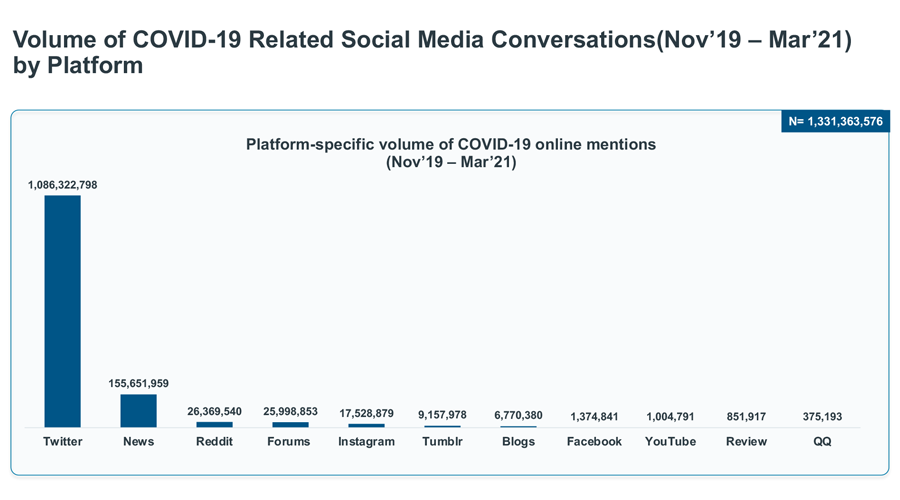
A Treasure Trove of Real-World Patient Insights
With 1B+ mentions, social participation on Twitter far exceeds that on any other platform. Even with the character limit on Twitter that limits a user’s ability to share details, this large, unstructured data set is rich in insights. In addition, participation on social platforms such as Reddit, blogs, Tumblr, Facebook, and forums are also significant. This makes public social conversations on COVID-19 a direct source of insights on real-world patient experiences and a treasure trove for social listening enthusiasts.
Analysis of geographic origin of the conversation shows that the United States leads the conversation followed by India, Japan, the UK, and Spain.
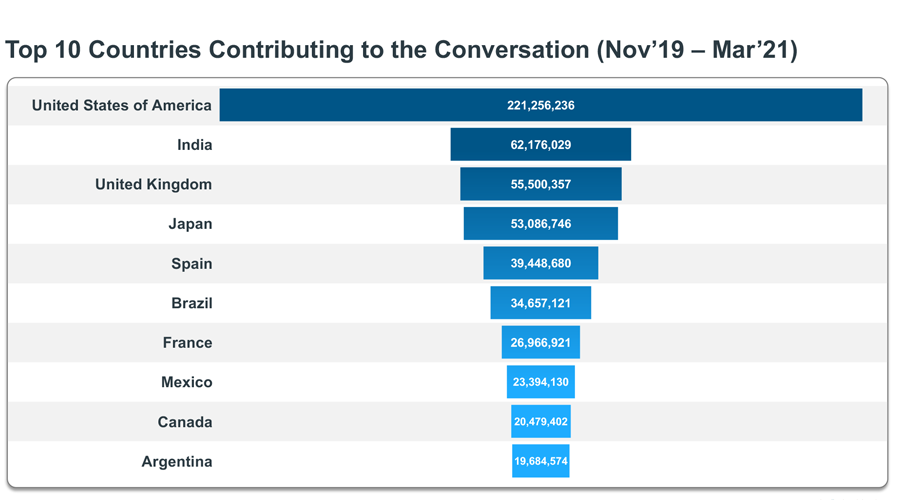
As seen on the timeline below, COVID-19 mentions peaked in March of 2020. At this point in time, analysis of conversation themes indicates topics such as testing, lockdown-related concerns, how the virus spreads, World Health Organization’s (WHO) guidelines and interventions, anticipation about drugs and treatment, etc.
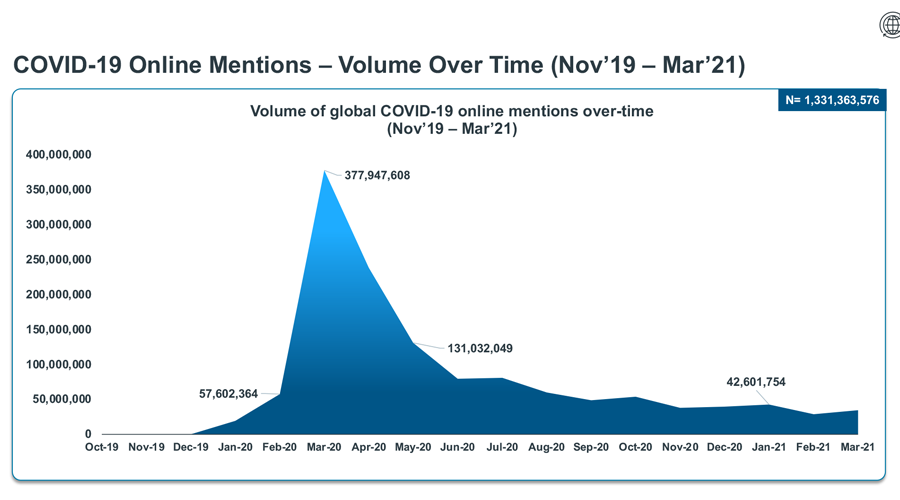
VACCINE? - BRING IT ON!
Another topic that gathered steam around March 2020 was the development of a vaccine for COVID-19. This conversation gradually declined until October 2020 and has been consistently rising since the vaccine rollout began. The vaccine conversation reached its peak in January 2021 as mass vaccination programs were rolled out by governments and health authorities in multiple countries.
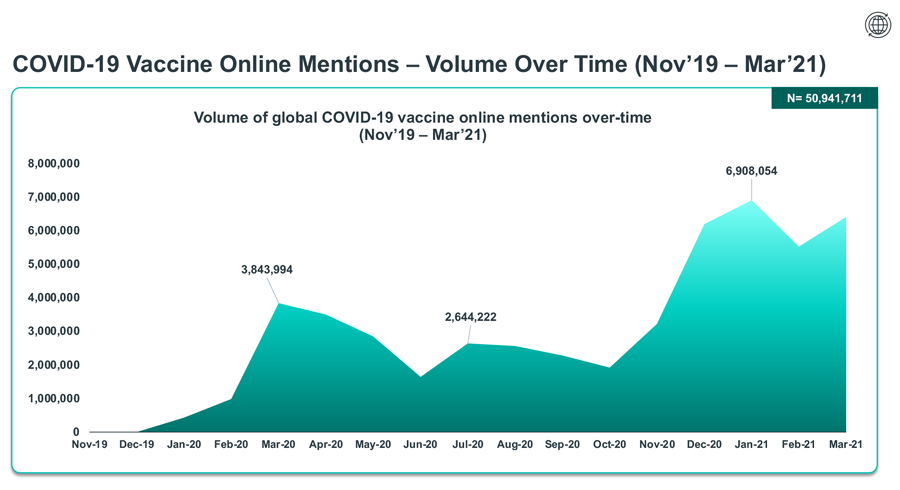
As expected, the COVID-19 vaccine topic has also received high participation online and in social media with 50M+ mentions globally and in all languages combined. Twitter leads the pack with 31M+ mentions followed by news, forums, blogs, Reddit, and Tumblr.

VACCINE CONVERSATION BRAND LEADERS
Of the 50M+ conversations related to COVID-19 vaccines, over 10M of these mentioned specific brands. With over 3.2M conversations, Moderna’s vaccine had the highest mentions followed by that of Pfizer/BioNTech (2.4M) and AstraZeneca/Oxford (1.4M). Aside from consumers, physicians and HCPs actively participated in the COVID-19 vaccine conversation on social media. Our estimate shows that over 50K HCPs were active. In the past 4 months, conversation on FDA-approved, branded COVID-19 vaccines has increased by over 250% as recently vaccinated consumers shared their post-vaccination experiences on social media. Qualitative analysis of such comments can reveal specific drivers of negative and positive sentiment and can help in identifying the patient-reported frequency post-vaccination experiences such as fever, chills, fatigue, nausea, headache, muscle pain, as well as injection-site reactions. Given the large size of such data, these insights can constitute significant real-world evidence. Further, analysis of conversations related to vaccine experiences can highlight challenges in delivering vaccinations such as scheduling appointments, access, waiting time, etc.
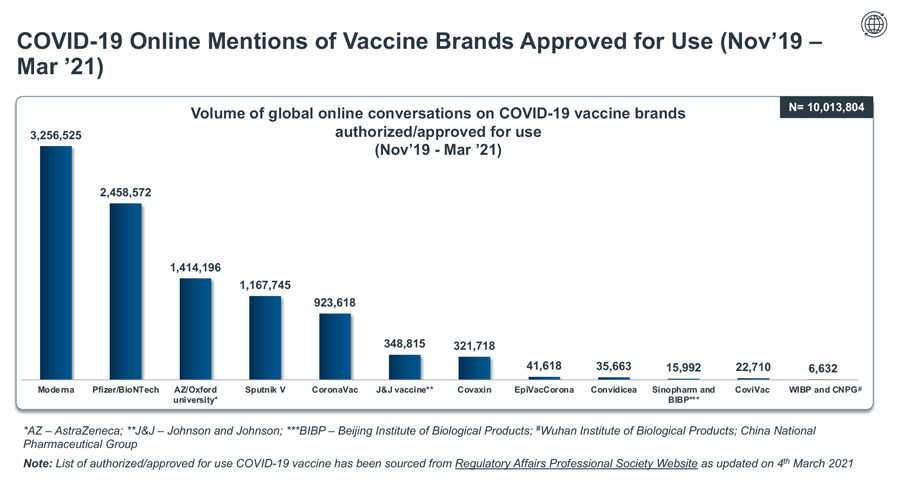
PERSPECTIVE OF VARIOUS STAKEHOLDERS
Physicians’ Perspective
Many physicians took to social media to advocate for COVID-19 vaccines. They proactively shared their own vaccine experiences to reduce vaccination hesitancy; for instance, many mentioned that they experienced minimal to no side effects post-vaccination. Physicians/HCPs/nurses encouraged online users to get COVID-19 vaccination to arrest the spread of the virus.
Clinical trial results published by vaccine manufacturers were frequently shared by physicians with their perspectives on the effectiveness of the vaccines. One of the top conversation themes related to approved COVID-19 vaccines was their effectiveness against the evolving COVID strains. Other identifiable conversation themes included the number of vaccine doses, post-vaccination death rates, and the long-term side effects of the COVID-19 vaccines.
Consumers’ Perspective
Consumers’ decision of choice of vaccine appeared to be influenced by information posted by physicians/HCPs on social media. Consumers expressed concerns about the limited data informing definitive long-term immunity provided by the vaccines, limited information on post-vaccination effects for individuals with comorbidities such as diabetes, and challenges in managing post-vaccination side effects such as fatigue, muscle pain, fever, etc. Some expressed concerns about the perceived effect of the vaccination on fertility.
Social media intelligence can also help in identifying information needs. For instance, many consumers sought information about the end-to-end vaccination process. Users asked questions about safety precautions to be followed at vaccination centers and long waiting times. Queries related to the second dose were also posted by users for both the Moderna and the Pfizer vaccine.
How Can Social Media Intelligence Help?
In-depth analysis of social conversation from various stakeholders on the COVID-19 vaccine rollout can provide actionable insights to:
- Pharmaceutical companies – analysis of social conversations can reveal post-vaccination symptoms and challenges faced by consumers in managing them in a real-world setting. Such insights could inform future clinical trials and identify potential patient-centric endpoints. Social conversations may also aid in detecting early signals related to safety issues.
- Federal/local governments – social conversation themes can reveal drivers of vaccine hesitancy and inform public communications policy aimed at raising awareness and maximizing vaccination rates.
- Pharmacies – monitoring vaccination experiences from local consumers can help in identifying access issues, scheduling challenges, communicating social distancing measures and managing human traffic effectively.
- Healthcare providers – HCPs can identify current challenges in vaccine distribution so that they pre-empt issues and prepare effectively for the vaccine rollout.
Visit our website for more information and click the Contact Us to receive more details on how to gain crucial market insight from Social Media Intelligence.
You may also be interested in
Related solutions
IQVIA Orchestrated Analytics connects actionable, intelligent insights across commercial teams to empower improved strategic decision making.
Connect data across your organization with master data management and data warehouse capabilities, and transform the way you make business decisions.
Combine data science, technology, and analytics driven by artificial intelligence to support new efficiencies and business insights -- without additional capital investment.





